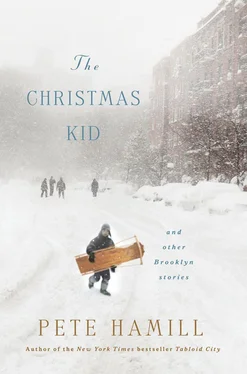Lev pulled away, but she held on. And then Ralphie Boy came around behind her and gave her a ferocious kick in the ass, and she let go, and then we were all running, Lev with us, and we didn’t stop until we were deep in the bushes of Prospect Park. We sat there, aching from the run, and then laughing at what Ralphie Boy had done. Lev didn’t laugh. He didn’t know a lot of English but he sure knew what Nora the Nose meant when she said the word “Jew.”
That night, my father came home angry because he’d run into a furious Nora McCarthy. He hated giving the Nose even a slight edge and wanted to know why we’d done what we did. We told him. He started laughing hard, and gave us each a hug and told us to dress quickly because we were going to Barney Augstein’s to see a fight on Barney’s new television set. We walked up 11th Street in the chilly evening to Barney’s. Across the street, Nora McCarthy was at the window, inspecting the block. My father walked over, spit in her yard, and yelled up at her: “Benny Leonard was a Jew!” I didn’t know who Benny Leonard was, but I knew from the way he said it that if Benny Leonard was a Jew, then being a Jew was a great thing. Nora McCarthy closed the window.
Barney Augstein’s living room was packed. Charlie Flanagan was mixing drinks in the kitchen. A woman named Bridget Moynihan was cooking a beef stew. In the living room, seated in a large chair, there was a lean, suntanned, dark-haired man with an amused look on his face. Lev brought me over and said something in Yiddish to this man, and the man shook my hand politely, while Lev told me that the man was his Uncle Meyer.
“Nice to meet you, sport,” Meyer said to me. “You take care of this kid, okay? He’s been through a lot.” He looked down at a diamond pinkie ring. “His mother, his father, the whole goddamn family, except him. They all got it. Know what I mean?”
Then he turned his attention to the TV, talking about Willie Pep with Charlie Flanagan, and about Ray Robinson with Barney Augstein, and then about baseball, and somehow the talk got around to Pete Reiser.
“Pete Reiser,” Lev said. “Like Christmas every day.”
“Now, there’s a smart kid,” said Meyer, and they all laughed. Meyer and Barney argued for a while about the fight on TV, and then Meyer produced the fattest roll of bills I’d ever seen. “Put your money where your mouth is,” Meyer said, and smiled.
“Come,” Lev said, and led me to his room. It was very small — a bed, a bureau, a chair. But it felt like a library. There were stacks of comic books everywhere, grammar books, two fat dictionaries. And drawings that Lev had made: Batman, the Green Lantern, Captain America, Donald Duck. There were other drawings, too; buildings with spirals of black cloud issuing from chimneys; barefoot men with shaved heads and gray pajamas; watchtowers; barbed wire.
“You’re an artist,” I said.
“An artist?”
“Yeah, an artist.”
“Pete Reiser is an artist?”
“Yeah,” I said. “In a way.”
“Like Christmas every day,” Lev said. “An artist.”
IV
Fall arrived. The days shortened. Most of us went to the Catholic school, but Lev enrolled in public school, where Ralphie Boy became his protector. Ralphie Boy had been kicked out of Catholic school.
“The kid is scared all the time,” Ralphie Boy told me. “I gotta teach him how to fight.”
Every day now, the woman named Bridget Moynihan was coming to Barney’s house. She was about forty and lived with her mother and had a plain, sweet face. Barney hired her as a housekeeper, to make sure Lev ate properly and washed himself and always had clean clothes.
“I tried,” Barney said to my father one day. “But I just got no talent for being a mother. This kid is family, you know. I’m his only living relative. But a mother I’m not.”
They started to go to the movies together: Barney and Charlie and Bridget and Lev. They took walks, and went shopping together, too. Then at Thanksgiving, Barney prepared a big dinner. He asked us to come over after our own dinner and make Lev feel like he had a home. But Lev was in his room when we got there, and he was crying. Barney asked me to talk to him.
“Go ’way,” Lev said, turning his back on me, sobbing into his pillow.
“What’s the matter, Lev?”
“Go ’way, go ’way.”
“You don’t like turkey, Lev?” I said.
He whirled around, full of anger. “Too much! Is too much! All food, food, food. Too much!”
I was a kid then, but looking into the eyes of a boy who had survived a death camp, even I understood.
V
After Thanksgiving, the Christmas season began. Down on Fifth Avenue, store windows magically filled with toys and train sets and red stockings. Christmas banners stretched across the downtown streets, painted with the slogans of Christmas, about peace on earth and good will toward men. Christmas music played from the loudspeakers, and there were Salvation Army bands outside Abraham & Straus and men selling chestnuts and rummies dressed in Santa Claus costumes, ringing little bells. We took Lev with us as we wandered these streets, and he was full of amazement and wonder.
“But what is?” he said. “What is they mean, Christmas?”
“Hey, Lev, fig- get it,” Ralphie Boy said. “You’re a Jew. Christmas is for Catlicks.”
“Explain, please.”
A theological discussion of extraordinary complexity then took place. Was Santa Claus a saint? Did they have Christmas bells in the stable in Bethlehem, and who made them? Did Joseph and Mary put stockings over the mantelpiece, and was there a mantelpiece in that stable? How come the Three Wise Men didn’t come on reindeer instead of camels, and, by the way, where did they come from? If Jesus was the son of God, why didn’t God just show up in person? It got even worse as we roamed around. But Lev stayed with it, almost burning with intensity, as if torn between the images in those store windows and the fact that he was a Jew.
“Why is not for Jews?” he said.
“Because Jesus was a Catlick, Lev,” Ralphie Boy explained.
“No, he wasn’t,” my brother, Tommy, said. “Jesus was a Jew.”
“Come on, ” Ralphie Boy said. “Stop kiddin’ around.”
“I ain’t kiddin’,” Tommy said. “Jesus was a Jew. So was his mother and father.”
“That’s right,” I said. “You could look it up.”
“Well, when did he become a Catlick? After he died? ”
“How do I know?” Tommy said. “All I know is, while he was here on earth he was a Jew.”
“Ridiculous!” Ralphie Boy said.
If Lev had any doubts about the essential craziness of the goyim, they were not resolved by this version of the Council of Trent.
VI
Then Barney Augstein got sick and was taken to Methodist Hospital. There were whispered conversations about what was wrong with him, and then plans were made by Bridget and my mother and Charlie Flanagan. Bridget moved into Barney’s house, and my mother and Tommy and I came over every night to help Lev with his homework, and the women decided they could give a Christmas party anyway. They would combine Hanukkah and Christmas, get a Christmas tree, hang pictures of Santa Claus around the house, but leave out all the mangers and statues of Jesus. Barney was part of the planning; he called each night from the hospital and talked to Lev and then Bridget, and later Bridget would talk to my mother.
“He wants to get the lad everything,” Bridget would say. “Train sets, and chemistry sets, and a big easel so he can paint. A camera. A radio. And I have to keep stopping him, because he’s gonna spoil that kid rotten.”
Читать дальше












